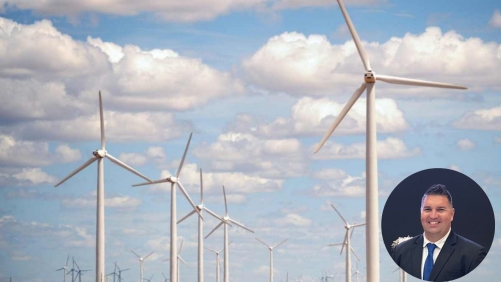Bahrain is making significant strides in its renewable energy efforts with the introduction of an innovative wind turbine system developed in Hungary. The groundbreaking technology harnesses the kinetic energy of airflow to generate electricity, even in minimal wind conditions. Tamas Hovany, Chairman of Bahrain-Hungary relations, emphasized the efficiency and space utilization advantages of this system, making it ideal for desert areas. The technology is also easy to install and maintain, as well as resistant to dusty and sandy environments.
According to Hovany, wind farms are already more efficient in producing energy compared to solar farms, with the potential for even greater efficiency with the use of new technologies. He highlighted the importance of land utilization in the renewable energy sector, pointing out that wind turbines require less space compared to solar power plants. A 3 MW wind turbine only occupies 0.1 hectares of land, while a solar power plant of the same size would require 7-8 hectares, making wind energy a more space-efficient option.
Hovany stressed that wind power should not always be preferred over solar power, as there are situations where solar power may be more suitable, such as in protection zones around residential areas where wind power is not recommended. However, the newly developed wind turbine system is set to revolutionize Bahrain’s wind energy sector, with plans to introduce and manufacture the technology in the country. This move aims to promote the adoption of wind energy and other renewable sources globally, showcasing Bahrain’s commitment to advancing in the field of renewable energy and environmental protection.
The introduction of the innovative wind turbine system in Bahrain is poised to contribute to the Kingdom’s renewable energy goals and environmental protection efforts. The technology’s ability to generate electricity in minimal wind conditions, coupled with its efficiency and space utilization advantages, positions it as a promising solution for desert areas. With plans to manufacture the system locally, Bahrain aims to showcase its commitment to advancing in the renewable energy sector and promoting the adoption of wind energy globally.
As highlighted by Hovany, wind farms have the potential to produce energy more efficiently than solar farms, especially with the use of new technologies that could further increase their utilization rates. The minimal land requirements of wind turbines compared to solar power plants make them a more space-efficient option, allowing for the agricultural use of the land under their blades. By prioritizing the use of lower-value land for wind farms, Bahrain can maximize its renewable energy production while preserving valuable agricultural land for other purposes.
While wind power may not always be the preferred option over solar power, the introduction of the innovative wind turbine system in Bahrain demonstrates the Kingdom’s commitment to exploring diverse renewable energy sources. By highlighting the advantages of wind energy and promoting its global recognition and adoption, Bahrain is positioning itself as a leader in the field of environmental protection and sustainable energy practices. The planned local manufacturing of the technology further showcases Bahrain’s dedication to advancing its renewable energy sector and contributing to a more sustainable future.










